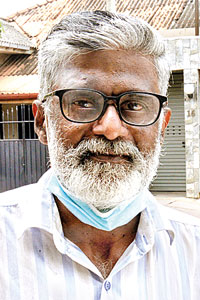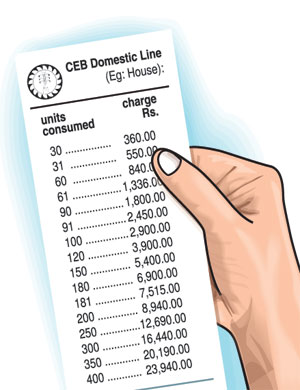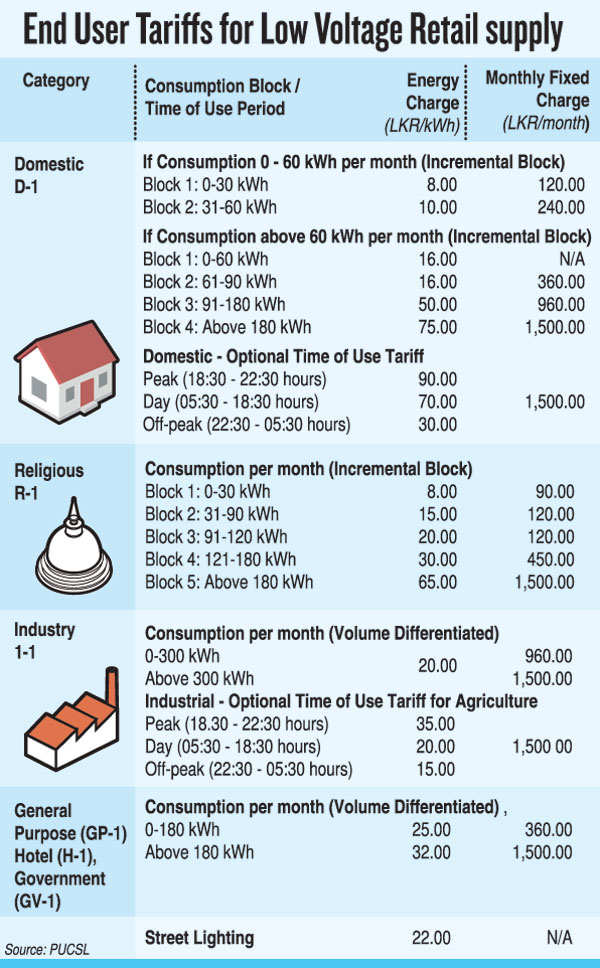News
Homes and businesses brace for electricity shock
View(s):By Nadia Fazlulhaq
Higher electricity costs will burn a hole in the budgets of households already struggling with unprecedented costs of living.
From this week, users will have to pay 75% more on average a month, the regulator announced.
For Kalyani, a mother of two young children, who has been maintaining a monthly electricity bill of about Rs 2,000, higher charges will stretch her financial resources.

Kalyani's children watching TV: Higher electricity costs will hit already struggling households Pix by Eshan Fernando
“The prices of all goods have skyrocketed. Now we have to worry about how much we will pay for electricity from next month,” she said, as her children watched television on a humid day with two fans switched on in the verandah.
Revised charges for electricity were announced by the Public Utilities Commission this week. Among the 7.8 million electricity users in the country, the majority or 6.7 million, are domestic users.

Thivanka Fonseka
Homes that use less than 30 units will pay 264% more. A unit will cots between Rs. 2.50 and Rs.8. The fixed monthly charge will be Rs.120.
Those using between 31 and 60 units will have to pay 211% more. A unit will cost them Rs.4.85 to Rs.10. Their monthly charge will be Rs. 240.
Those using between 61-90 units will face an increase of 125%. A unit charge will increase from Rs 7.85 to Rs.16. The monthly charge is Rs.360.
The increase for users of 91-120 units will be 89%. The charge for a unit will increase from Rs. 27 to Rs.50. Users of between 90 and 180 units will pay Rs. 960 a month.
A 79% increase will apply to users of between 121-180 units. A unit will cost Rs 75. For those using 180 or more, a fixed charge of Rs.1,500 will apply.
PUC chairman Janaka Ratnayake said electricity charges had not been revised by the Ceylon Electricity Board in nine years.
He said that although the CEB had sought average increases of 229% and 183% previously, that had been rejected.
For home users, the CEB had proposed an average monthly charge of Rs. 508 for those using up to 30 units. However, approval was given only for a charge of Rs. 198, he said.

M. Farhaan
For 31-60 units CEB has proposed an average monthly charge of Rs.1,488. However, approval was given for Rs. 599. For users of 61-90 units, the CEB had sought Rs. 2,439, but approval was given for Rs.1,461. CEB’s proposal to increase the charges for users of 91-120 units to Rs. 3,546 was not approved. They will get an average bill of Rs. 2,976, the regulator said.
All goods and services that depend on electricity are planning to increase prices starting from this week, while others said they will wait until this month’s bill is issued.
Owners of photocopying, printing services, shops selling frozen food items, retail shops, pharmacies, bakeries, eateries that use rice cookers and steamers are weighing price increases.
M.S. Chandana who has operated a communications outlet for the past 10 years, said the electricity tariff rise will affect small and medium scale businesses.
“There is a paper shortage, sales have dropped due to online classes, rents have increased and now the electricity bill increase. A photocopy that was Rs. 5 last year have been increased to Rs.12. We will have to increase the price of printouts, photocopies, and scans,” he said.
M. Farhaan, a poultry shop owner in Rajagiriya fears sales will drop if he increases prices.

M.S. Chandana
“Our deep freezers are working 24/7 and the display coolers are switched on when the shop is open. Switching off can result in food poisoning. We will have to add more to the price of chicken sold here. Already a kilo of chicken is sold for Rs.1,320 whereas it was only Rs. 600 last year,” he said.
Office managers are now looking into further cutting down their electricity use by switching off air conditioning even during hot and humid days.
Thivanka Fonseka from Madinnagoda said his monthly electricity bill is about Rs. 8,500.
“We have an AC that we use for about two to three hours in the evening. Now planning to use the fan instead and will switch off lights as much as possible. Hopefully, we won’t get a bill of about 15,000 rupees,” he said.
“Gas and fuel [prices] were reduced by meagre amounts and electricity tariff was increased by a very high percentage. This will definitely result in us increasing the prices of lunch packets,” said H.K.K. Anjani, who co-owns a food boutique.
 A bakery owner who relies on electric ovens said prices will be increased depending on this month’s bill.
A bakery owner who relies on electric ovens said prices will be increased depending on this month’s bill.
Consumer Rights Organization’s Ranjith Vithanage said the CEB’s current losses are due to poor management, high salaries, wastage, and emergency power purchases.
“The Public Utilities Commission shouldn’t have approved tariff hikes at this time knowing people are struggling without salary increases and the sky rocketing cost of living,” he said.
Those who bought electric vehicles and electric appliances during the gas and fuel scarcity will be burdened by higher tariffs.
“Many people bought induction cookers, rice cookers, and other electric appliances because there was no LP gas. Some cooked [meals to last] for a week, refrigerated and reheated using the microwave,” said Ms Ayodya Gunewardena, a housewife from Colombo.
“If solar power was affordable to the public, many would have switched to this renewable energy to save electricity costs,” said S. James from Nugegoda.

The best way to say that you found the home of your dreams is by finding it on Hitad.lk. We have listings for apartments for sale or rent in Sri Lanka, no matter what locale you're looking for! Whether you live in Colombo, Galle, Kandy, Matara, Jaffna and more - we've got them all!

